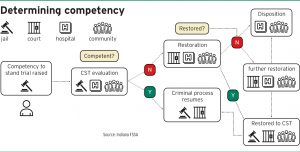Subscriber Benefit
As a subscriber you can listen to articles at work, in the car, or while you work out. Subscribe NowAttorneys and judicial officers in Indiana are seeing a rise in competency evaluation requests, along with an increase in mental health needs throughout the criminal justice system.
The Indiana Family and Social Services Administration’s Division of Mental Health and Addiction received 535 incompetency orders in 2023. In 2022, that number was 457.
To be evaluated for competency to stand trial, an attorney or judge has to recognize that the defendant may be incapable of understanding the court process. Megan Shipley, an attorney with the Marion County Public Defender Agency, said it is typically the defense attorney who recognizes a lack of competency, as they are the ones usually meeting and talking with the defendants the most.
If a judge grants a request for a competency evaluation, then they will appoint two doctors, a psychologist or psychiatrist, to assess the defendant.
Those two doctors will meet with the defendant in jail and determine whether they are able to understand the court proceedings and assist an attorney in their defense.
The doctors then file a written report, and the court will hold a hearing to decide whether the person is competent. If they are found competent, then the case proceeds as normal.
But if they are found incompetent, then the trial court will enter a commitment order and refer them to the state’s Department of Mental Health and Addiction, where a facility will be determined for placement. The defendant is then sent to a state hospital, where competency restoration efforts begin.
Competency restoration can include medication or other treatments. The defendant also receives legal education to teach them the court proceedings.
Ultimately, the state facility determines whether the defendant has been restored to competency.
If a defendant reaches six months in a state facility and competency is still not restored, then they are committed to the state hospital, creating a different court proceeding, Shipley said. But she also said most people are restored to competency, so their criminal case resumes.

Fountain Circuit Judge Stephanie Campbell said it can cost anywhere between $1,000 to $3,000 to complete one competency exam.
“It is a big part of the budget,” Campbell said.
Defendants go through at least two, and sometimes three, competency evaluations.
Campbell said the problem she encounters in a smaller county is a lack of resources and services. To that end, she said defendants sit in jail much longer than they should because they are waiting for an evaluation.
Shipley added that the defendant does receive credit time toward their sentence, if convicted, for the time they are waiting for the exam, plus the time they spend on restoration.
Criminal cases
Recent cases in which a defendant’s competency to stand trial was questioned include a case where a woman with intellectual disabilities was charged with two counts of Class A felony child molesting.
The case — Esther Martin v. State of Indiana, 22A-PC-2574 — was set for trial in July 2014, but the case ended in a mistrial when a juror sent a note to the judge asking if defendant Esther Martin’s mental state had been assessed.
Martin was committed to Madison State Hospital for restoration efforts. Despite her low IQ, she scored high on a legal terminology test, so the trial was reset for January 2016.
Martin was later convicted and sentenced to 80 years, although the Court of Appeals of Indiana reduced her sentence to 40 years on direct appeal.
But a COA majority affirmed the rejection of Martin’s post-conviction relief petition.
The dissent, however, questioned whether Martin’s competency had ever truly been restored.
“During (Madison State Hospital’s) ‘restoration’ of Martin’s intellectual abilities to gain an understanding of the legal process, it was obvious that, although Martin had memorization capabilities to a certain extent, these abilities declined rapidly once she was no longer ‘drilled,’” Judge Patricia Riley wrote in her dissent. “By the time of the second trial, it can be reasonably inferred that, in the absence of constant drilling and repetition, Martin had resorted back to her initial intellectual baseline.”
More recently, the mental state of Richard Allen — the man charged in the 2017 deaths of Delphi teens Liberty “Libby” German and Abigail “Abby” Williams — has been at issue in his murder case.
Court documents indicate Allen confessed to the murder multiple times in a prison phone call with his wife, but his defense attorneys attributed some of his admissions to his allegedly declining mental state, according to The Associated Press.
Allen’s lawyers also asked for their client to be moved from the Westville Correctional Facility, citing a “dramatic change in Mr. Allen’s condition, including his change in demeanor, change in appearance and change in his overall mental status,” AP reported.
Allen was ultimately moved to the Wabash Valley Correctional Facility in December 2023, according to the Journal & Courier.
Meanwhile, Special Judge Fran Gull granted a motion to quash a state subpoena for Allen’s prison medical and mental health records, while granting a motion to release those same records to the defense.
Allen was charged in October 2022, and he is scheduled for trial on Oct. 15, 2024.

Legislation
Competency issues are also under consideration by the Indiana Legislature.
This year’s House Bill 1238 would allow advanced practice registered nurses and physician assistants with psychiatric licensing to perform the competency evaluations. Currently, only a psychologist or psychiatrist can perform the evaluation.
The bill would also allow a court to dismiss criminal charges without prejudice if the defendant has a certain diagnosis and is charged with a misdemeanor or Level 6 felony.
Rep. Wendy McNamara, R-Evansville, said her inspiration for authoring the bill came from discovering how long someone can wait for an evaluation.
“This is a multitiered problem. Your local governments often have difficulty finding a psychologist or psychiatrist to do the initial evaluation. Sometimes it can be as long as six months,” McNamara said.
She added that courts have had to go to neighboring states to find a psychiatrist or psychologist to perform the evaluation.
“… They’re actually spending more time in jail or a mental health facility than they would in a lot of cases for their initial charge,” McNamara said.
So far, the bill has been supported, with no opposition when it was heard in the House Courts and Criminal Code Committee, which McNamara chairs.
“It is supported by everybody in the criminal justice system, from judges to prosecutors and public defenders,” McNamara said.
She proposed a similar bill in last year’s session, but it died in the Senate due to a lack of support from psychiatrists.
“We’ve come to some negotiations this year,” McNamara said. “And while I’m not sure they’re going to actually come out and say, ‘We support this 100%,’ they are going to at least remain neutral.”
HB 1238 was amended in committee to include a requirement for the Division of Mental Health and Addiction to establish a training program to certify a competency evaluator to assist a court in determining competency.
After passing out of Courts and Criminal Code, HB 1238 was referred the House Ways and Means Committee. A hearing on the bill in that committee was scheduled for Jan. 30 at Indiana Lawyer deadline.•
Please enable JavaScript to view this content.

